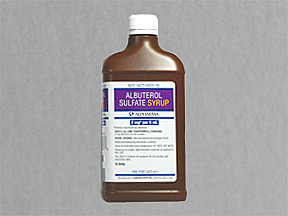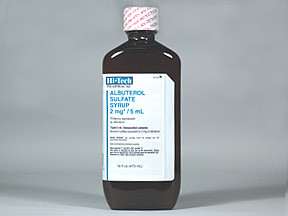ALBUTEROL (SALBUTAMOL) LIQUID - ORAL
PHONETIC PRONUNCIATION: (al-BUE-ter-ol/sal-BUE-ta-mol)
COMMON BRAND NAME(S): Proventil
GENERIC NAME(S): albuterol sulfate
Uses
USES: Albuterol (also known as salbutamol) is used to treat wheezing and shortness of breath caused by breathing problems (such as asthma, chronic obstructive pulmonary disease). Albuterol belongs to a class of drugs known as bronchodilators. It works in the airways by opening breathing passages and relaxing muscles. Controlling symptoms of breathing problems can decrease time lost from work or school. This medication is taken by mouth and does not work right away. It should not be used for sudden attacks of breathing trouble. Your doctor may prescribe a quick-relief inhaler for sudden shortness of breath/asthma attacks while you are on this medication. Always have the quick-relief inhaler with you. Consult your doctor or pharmacist for more details.
How to use ALBUTEROL (SALBUTAMOL) LIQUID - ORAL
HOW TO USE: Take this medication by mouth as directed by your doctor, usually 3 or 4 times daily. Dosage is based on your medical condition and response to treatment. Adults and children older than 12 years should not take more than 32 milligrams a day. Children aged 6 to 12 years should not take more than 24 milligrams a day. Children aged 2 to 5 years should not take more than 12 milligrams a day. Carefully measure your prescribed dose using a medication-measuring device or spoon. Do not use a household spoon because you may not get the correct dose. Use this medication regularly to get the most benefit from it. To help you remember, take it at the same times each day. Do not increase your dose or take this drug more often than prescribed because your risk of serious side effects will increase. Learn which of your medications you should use every day and which you should use if your breathing suddenly worsens. Ask your doctor what to do if you have worsening cough or shortness of breath, wheezing, increased sputum, worsening peak flow meter readings, increased use of your quick-relief inhaler, or if your quick-relief inhaler does not seem to be working well. Learn when you can self-medicate and when you should get medical help right away.
Side Effects
Precautions
Interactions
Overdose
Images
Reviews
Faq for ALBUTEROL (SALBUTAMOL) LIQUID - ORAL
Answer: Albuterol (Salbutamol) Liquid is used to treat and prevent symptoms of asthma, such as wheezing, shortness of breath, and chest tightness.
Answer: Take Albuterol (Salbutamol) Liquid by mouth, usually 3 to 4 times a day, or as directed by your doctor. Shake the bottle well before each dose and measure the dose using a special measuring device/spoon. It is important to follow your doctor's instructions carefully.
Answer: If you miss a dose, take it as soon as you remember. If it is near the time of the next dose, skip the missed dose, and resume your regular dosing schedule. Do not double the dose to catch up.
Answer: Common side effects of Albuterol (Salbutamol) Liquid may include nervousness, shaking/tremor, headache, dizziness, or throat irritation. However, seek immediate medical attention if you experience chest pain, fast/irregular heartbeat, severe dizziness, or difficulty breathing.
Answer: Yes, Albuterol (Salbutamol) Liquid can be used in children. However, the dosage may vary depending on the child's age and weight. It is important to consult a pediatrician or healthcare provider for appropriate dosing instructions.
Answer: Albuterol (Salbutamol) Liquid may interact with other medications, such as beta-blockers, diuretics, or other asthma medicines. It is important to inform your doctor about all the medications you are currently taking to avoid potential interactions.
Disclaimer
IMPORTANT: HOW TO USE THIS INFORMATION: This is a summary and does NOT have all possible information about this product. This information does not assure that this product is safe, effective, or appropriate for you. This information is not individual medical advice and does not substitute for the advice of your health care professional. Always ask your health care professional for complete information about this product and your specific health needs.


No Reviews Yet